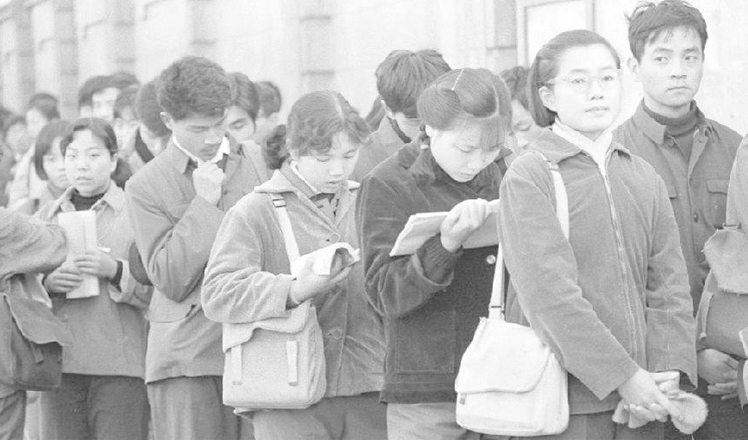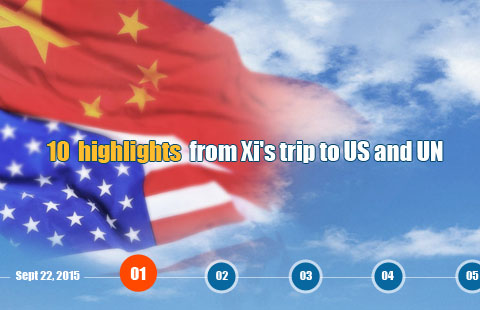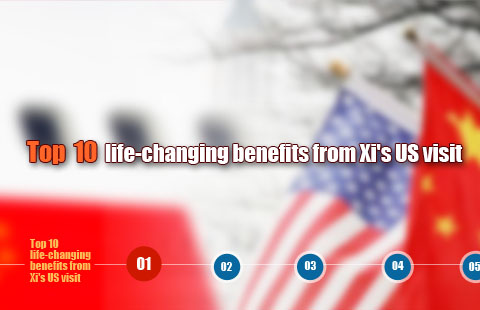Xi put spotlight on China's growing global role: LatAm experts
Updated: 2015-10-05 05:09
By MAO PENGFEI(China Daily Latin America)
|
||||||||
Chinese President Xi Jinping's recent state visit to the United States and addresses at the United Nations underscored the country's growing role on the world stage, Latin American experts said.
From Xi's meeting with US President Barack Obama in Washington on Sept 24 to his participation at the Sustainable Development Summit at UN headquarters in New York on Sept 26, and his speech to the General Assembly on Sept 28, the message was China is ready to take on the challenges and responsibilities of being a world power, the experts said.
"China is a global power that is now assuming its international responsibilities. As part of this, it is seeking to take on a more active role within the UN," said Marisela Connelly, a professor at the Center for Asian and African Studies at Colegio de Mexico.
He said this was exemplified by Xi's pledge of $1 billion to the UN's peace-building fund.
China, he said, will also join the UN Peacekeeping Capability Readiness System, designed to ensure the timely deployment of troops, and will take the lead by setting up a permanent 8,000-strong standby force.
China's pledge of billions in aid and investment to less developed countries, as part of South-South cooperation, will help meet key poverty reduction targets, said Pia Taracena Gout, an authority on international relations who is at Mexico City's Ibero-American University.
Xi pledged $2 billion at the Sustainable Development Summit to support developing nations' efforts to achieve UN-designated post-2015 development goals.
"President Xi Jinping's speech to the world at UN headquarters was very positive and very significant," Taracena said. "It's clear that we need leadership, and joint leadership, in various matters that affect the globe, such as development."
Xi said that in addition to the aid, China will strive to increase its investment in less developed countries to $12 billion by 2030, the deadline set by the UN for meeting a new set of development goals that aim to eradicate poverty in 15 years.
World leaders, such as Xi, said Taracena, can help bolster the international community's push toward common goals designed to improve lives and care for the environment.
"I definitely believe that in these types of forums, world leaders can strengthen the commitment," she said.
Xi's US trip also served to highlight the degree of interdependence between the world's two largest economies, according to international analyst Jorge Castro.
In an editorial published in the Argentinian daily Clarin and headlined "Obama and Xi Jinping set the rules," Castro asserted "the US economy cannot be 'normalized' without the backing of China."
Castro, who defined "normalize" as "setting interest rates that are consistent with the rate of potential growth," said the US has acknowledged as much.
"After seven years of inaction, and 5.3 percent unemployment ... the Federal Reserve did not increase the interest rate, and argued it was due to deflationary pressure from China," wrote Castro.
Bilateral trade between China and the US surpassed $555 billion in 2014, the highest in the world, and reciprocal investment reached $120 billion, with Chinese investment in 45 of the US' 50 states, noted Castro.
"The key to the relationship," he said, is the Bilateral Investment Treaty, "which will conclude in 2016 and implies the unrestricted access of capital from both countries to all of the other's productive and service sectors," except for a handful of security interests.
"Today, power is being able to set the rules that guide the evolution of global society; and only global players can do that, chiefly China and the US," said Castro, adding "the Xi Jinping/Barack Obama agenda is oriented towards the future (and) founded on a common vision."
Sergio Ley, a China expert and former Mexican diplomat, acknowledged that discord and rivalry is inevitable between the two superpowers, but the world's two largest economies are obliged to hold frank and frequent talks to resolve differences.
As such, Xi's recent state visit was a step in the right direction, said Ley, Mexico's ambassador to China from 2001 to 2006, and head of the Asia-Pacific division of the Mexican Business Council for Foreign Trade, Investment and Technology.
Now, it's up to the United States "to accommodate China's resurgence as a global power," added Ley.
In the interest of building trust, Xi's speech to the US business community in Seattle, the first stop on his US tour, was key, said Ley, as it served to strike a note of openness and conciliation as part of mutual cooperation and benefit.
Also important, said Ley, was Xi's subsequent speech at the UN General Assembly, in which he allayed fears of an expansionist China looking to broaden its sphere of influence.
"I think there is a community of ideas, of goals, of interests between the two countries, and both must take advantage of it to build the foundation of trust that will be needed to preserve peace in the 21st century," said Ley.
- Russian warplanes hit IS targets in Syria
- Senior US envoy to visit Japan, S Korea, China
- Russia, US agree to cooperate in solving Syria crisis: Russian FM
- Iranian President calls Iran deal victory over war
- LatAm experts praise Xi on yuan, globalization
- Evidence found of summertime water flows on Mars: study

 Candlelight vigil for Oregon shooting victims
Candlelight vigil for Oregon shooting victims
 Chinese people's pursuits in different eras
Chinese people's pursuits in different eras
 Ten highlights from Xi's trip to US and UN
Ten highlights from Xi's trip to US and UN
 Top 10 life-changing benefits from Xi's US visit
Top 10 life-changing benefits from Xi's US visit-
 Highlights of President Xi's speeches at UN
Highlights of President Xi's speeches at UN -
 The president's historic journey to the west
The president's historic journey to the west -
 China's first lady visits Juilliard School
China's first lady visits Juilliard School 
 Across Canada
Across Canada
Most Viewed
Editor's Picks

|

|

|

|

|

|
Today's Top News
Huntsman says Sino-US relationship needs common goals
Xi pledges $2 billion to help developing countries
Young people from US look forward to Xi's state visit: Survey
US to accept more refugees than planned
Li calls on State-owned firms to tap more global markets
Apple's iOS App Store suffers first major attack
Japan enacts new security laws to overturn postwar pacifism
Court catalogs schools' violent crimes
US Weekly

|

|







